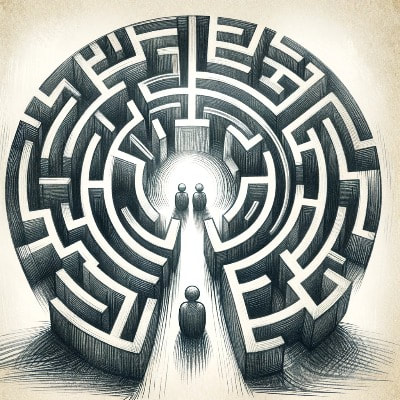|
This blog post was reviewed and approved for publication by Chenhang Zou M.D., a Board-certified psychiatrist at Apraku Psychiatry.
Embarking on a journey towards mental health can often feel like entering an intricate maze. You stand on the precipice, faced with a plethora of professional titles — therapist, psychiatrist, psychologist — and find yourself wondering: ‘Who’s who in this landscape, and who might best cater to my needs?’
It’s easy to feel lost and overwhelmed, especially when each step you take towards seeking help seems to plunge you deeper into confusion. Yet, you are far from alone in this perplexing journey. Navigating the world of mental health professions is a common conundrum, often serving as a stumbling block for many individuals seeking help. However, confusion need not lead to stagnation. A little clarity can transform what seemed to be an impenetrable labyrinth into a navigable path. In this article, we will demystify this puzzle, focusing on two pivotal figures within the mental health profession: therapists and psychiatrists. Through a clear understanding of their roles and responsibilities, you’ll not only better appreciate the differences between these two professions, but you’ll also be empowered to take the first — or perhaps the next — step in your personal mental health journey. So, are you ready to unlock the door to a deeper understanding of the mental health landscape? Let’s delve in. Mental Health Professions: Who’s who?Embarking on a mental health journey often introduces us to a multitude of professional titles, each vital in its own right, each serving a unique purpose. So, who are these professionals, and what roles do they play?
These professions form the foundation of the mental health field, each offering different approaches to help individuals improve their mental wellbeing. Top Highlights
Deep Dive into the Role of a PsychiatristA psychiatrist is a key figure in mental healthcare. Psychiatrists are medical doctors specializing in mental health. They're equipped not only to offer psychotherapy and diagnose and treat complex mental health conditions through medication management. Often dealing with moderate to severe mental health issues such as bipolar disorder, severe depression, and anxiety disorders, psychiatrists have a deep understanding of the physical and mental effects of these conditions. Their medical training enables them to consider how physiological issues influence mental health, leading to a holistic approach to care. Their education path is demanding. After completing pre-medical training as part of an undergraduate degree, aspiring psychiatrists enter medical school for a four-year program. This is followed by a residency in psychiatry, usually lasting another four years, during which they receive advanced training in diagnosing and treating mental health disorders. Psychiatrists can prescribe medication, a capability therapists generally don’t possess. They regularly review patients’ progress and adjust medication regimens accordingly, an important aspect of managing mental health disorders. Deep Dive into the Role of a TherapistThe role of a therapist is about fostering understanding, facilitating personal growth, and helping individuals navigate life’s challenges. As guides on the journey towards mental and emotional wellbeing, therapists offer a compassionate ear, a safe space for self-exploration, and a reservoir of strategies to cope with various issues. Therapists wear many hats. They might help an individual grappling with mild to moderate anxiety, support a couple navigating marital issues, or assist a family in addressing intergenerational conflict. Their clients span all ages and backgrounds, each with unique needs and goals. The types of therapy that therapists offer are as diverse as their patient population. Cognitive-behavioral therapy (CBT), dialectical behavior therapy (DBT), psychodynamic therapy, solution-focused therapy, and humanistic therapy are among the many modalities therapists use. Each approach is different but is designed to help clients understand their feelings, mitigate problematic behaviors, and develop coping strategies. Becoming a therapist requires rigorous training. After obtaining a bachelor’s degree, prospective therapists undertake a master’s or doctoral program in fields such as psychology, counseling, or social work. This is followed by supervised clinical experience, after which they may seek licensure. Continuous education is a key aspect of their profession as it ensures they remain up-to-date with the latest therapeutic approaches and research. Comparing Therapists and PsychiatristsComparing therapists and psychiatrists is not about identifying who’s 'better'. Instead, it’s about understanding their distinct roles and capabilities, empowering you to make an informed decision about who might best serve your needs.
In essence, therapists and psychiatrists are complementary rather than competitive. Their roles overlap in many areas, but each brings unique skills to the table. Understanding their differences is the key to navigating the mental health field, helping you to find the most appropriate support for your journey towards better mental health. Conclusion: Navigating towards Better Mental HealthThe choice between a therapist and a psychiatrist is all about finding the right fit for your unique needs. For some, a therapist’s approach of talk therapy could be the ideal route to manage stress, emotional challenges, or relationship issues. For others, the medical expertise of a psychiatrist might be necessary, particularly for severe mental health conditions that might require medication. Ultimately, the goal is your well-being. No matter which professional you choose to help you navigate your mental health journey, know that taking this first step is a victory in itself. Each profession brings its own set of tools to the table, and the most important thing is finding the professional that best matches your needs. So, turn that key, open the door, and step into the world of tailored mental health support. Your journey to better mental health begins with understanding – and you’ve already taken the first, most crucial step by seeking that understanding here. Congratulations on beginning your journey, and remember, support is always available when you need it. This blog post is brought to you by Apraku Psychiatry. Apraku Psychiatry is a private practice offering video appointments with Board-certified psychiatrists licensed in multiple states. More blog articles can be found here. To schedule an appointment with one of our psychiatrists, patients can complete the online booking form. Comments are closed.
|
Copyright © Apraku Psychiatry 2024


